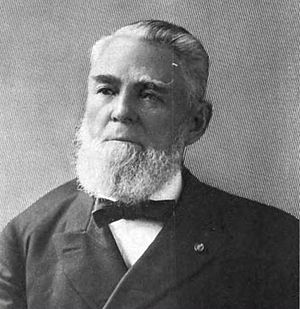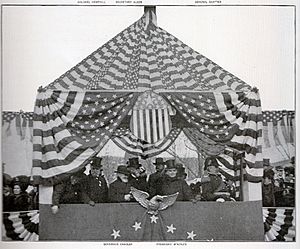Allen D. Candler facts for kids
Quick facts for kids
Allen Daniel Candler
|
|
|---|---|
 |
|
| 56th Governor of Georgia | |
| In office October 29, 1898 – October 25, 1902 |
|
| Preceded by | William Y. Atkinson |
| Succeeded by | Joseph M. Terrell |
| 14th Secretary of State of Georgia | |
| In office 1894–1898 |
|
| Preceded by | Philip Cook, Sr. |
| Succeeded by | William C. Clifton |
| Member of the U.S. House of Representatives from Georgia's 9th district |
|
| In office March 4, 1883 – March 3, 1891 |
|
| Preceded by | Emory Speer |
| Succeeded by | Thomas E. Winn |
| Member of the Georgia Senate | |
| In office 1878–1880 |
|
| Member of the Georgia House of Representatives | |
| In office 1873–1878 |
|
| Personal details | |
| Born | November 4, 1834 Auraria, Georgia, U.S. |
| Died | October 26, 1910 (aged 75) Atlanta, Georgia, U.S. |
| Political party | Democratic |
| Spouse | Eugenia Williams |
| Residence | Gainesville, Georgia |
| Alma mater | Mercer University |
| Occupation |
|
Allen Daniel Candler (born November 4, 1834 – died October 26, 1910) was an important political leader from Georgia. He served in many roles, including a state lawmaker, a member of the U.S. Congress, and the 56th Governor of Georgia. He is remembered for his long career in public service.
Contents
Early Life and Education
Allen Daniel Candler was born in Auraria, Georgia, on November 4, 1834. He was the oldest of twelve children in his family. Auraria was a mining town located in Lumpkin County, a mountainous area.
As a young person, Candler went to local country schools. Later, he attended Mercer University in Macon, Georgia, and graduated in 1859. After college, he briefly studied law. He then worked as a teacher.
Service in the Civil War
In May 1862, Allen Candler joined the Confederate Army as a private. His fellow soldiers quickly elected him as a first lieutenant. He fought in some of the toughest battles of the Civil War. These included major battles like Vicksburg, Missionary Ridge, Resaca, Kennesaw Mountain, Atlanta, and Jonesboro.
By the end of the war, he had become a colonel. He served under General Joseph E. Johnston in the Army of Tennessee in North Carolina. Candler was injured during the war; he was wounded at Kennesaw and lost an eye at Jonesboro. After the war, he joked that he was lucky compared to many others. He said he felt "quite wealthy" with his wife, baby, one eye, and one silver dollar.
Political Career
After the Civil War, Candler lived in Jonesboro, Georgia, and then Gainesville, Georgia. He started out as a farmer. Soon, he became involved in politics. He was one of many conservative Democrats who wanted to regain control of Georgia. At that time, the state government was run by Republicans during the Reconstruction period, with support from the Union Army.
In 1872, Candler was elected Mayor of Gainesville. The next year, in 1873, he was elected to the Georgia House of Representatives. He served there until 1878. Then, he was elected to the Georgia Senate in 1878, serving for two years. During this time, Candler also worked in manufacturing and was the president of a railroad company.
Serving in the U.S. Congress
In 1882, Candler was elected to the U.S. House of Representatives. He served in the 48th Congress from 1883 to 1891. While in Congress, he was the chairman of the Committee on Education during his third term. Candler decided not to run for re-election in 1890.
Secretary of State and Governor
After his time in Congress, Candler served as Secretary of State of Georgia from 1894 to 1898. He then resigned from that role to run for Governor. He campaigned as the "one-eyed ploughboy from Pigeon Roost." He won the election with 70% of the votes. After serving his first two-year term, Candler was re-elected in 1900.

As governor, Candler was known for his conservative approach. He worked to lower taxes and reduce government spending. He also helped establish pensions for widows of Confederate soldiers. Governor Candler supported the idea of a primary election where only white voters could choose Democratic candidates. He believed the Democratic Party was a private group, so it didn't have to follow the Fifteenth Amendment, which gave all Americans the right to vote regardless of race. In Georgia, the Democratic primary was very important because Democrats usually won all elections from the 1870s until the 1970s.
During his time as governor, there were many instances of mob violence in Georgia. Governor Candler publicly spoke out against this violence. He also asked the courts to hold trials more quickly to try and prevent mobs from forming.
Later Life and Legacy
After leaving the Governor's office, Allen Candler became the State's first person to collect and organize historical records. He worked on this important task until his death on October 26, 1910, in Atlanta, Georgia. He was buried at Alta Vista cemetery in Gainesville.
Candler County, Georgia, was named in 1914 in his honor. This was to show appreciation for his hard work in gathering and editing almost thirty volumes of Georgia's historical records. These records covered the Colonial, Revolutionary, and Confederate periods of the state's history.
 | Valerie Thomas |
 | Frederick McKinley Jones |
 | George Edward Alcorn Jr. |
 | Thomas Mensah |

